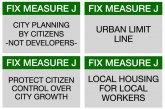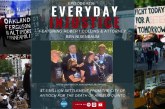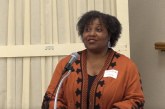

By David M. Greenwald
Executive Editor
Davis, CA – Right now it appears at the next council meeting, a week from this coming Tuesday, the council will have a discussion on whether to put forward an amendment to Measure J on the November ballot.
Let me be clear—as I have expressed in recent weeks and months, I fully believe that Measure J has become unworkable as it is currently structured.
There seems to be an idea to let things play out with the current projects going forward. In theory I can see that perspective. But given the track record of the voters on housing projects and the lack of approvals over the last 25 years and the lack of new single-family housing—or even family housing of any kind built over the last 16 years, I think that is a risky gamble.
There is a good chance that the current projects could be defeated by the voters and, if that happens, it is unclear how the city would meet its housing obligations. There seems to be an assumption that there will be multiple bites at the apple—but that may not be case.
How likely are the voters to pass a Measure J amendment?
That’s where I think the council is flying a bit blind. I would suspect, though I have not seen any survey data on this, that the public is not likely to support serious  amendments to Measure J.
amendments to Measure J.
The voters, after all, approved the most recent re-authorization of Measure J in 2020 with about 83 percent of the vote. That’s pretty overwhelming.
Every time there have been suggestions for some amendments to Measure J, the council has backed down and simply put the measure back to the voters as currently written.
One difference now as opposed to 2020 is that the vote would be between the current version of Measure J and a proposed amendment. That means a no vote keeps the status quo. That probably makes it more likely that the council would put something forward now as opposed to 2030 when the actual measure needs renewal.
There are also electoral calculations. Three members of the current council are up for election in November—although Will Arnold is widely expected to announce he is not going to seek a third term (though he has not formally done so yet).
That leaves Donna Neville, who was just elected in a special election last year, and Josh Chapman facing immediate election. Speculating here, I would think Chapman would be more reluctant than Neville in terms of being willing to put an amendment on the ballot, while I would think both Bapu Vaitla and Gloria Partida, who have expressed interest in an amendment at various times in the past, would likely be supportive of doing so soon.
With that said, I have some concerns about doing so now. While I am fully supportive of a Measure J amendment either as a shift to an urban limit line or a lower threshold affordable housing project (maybe at 40 percent affordable rather than 100 percent affordable, as the current exemption requires), I am not sure the voters are fully aware of what the city is facing.
As I understand it, what the city is facing is:
- Limited infill space for sufficient housing let alone sufficient affordable housing in the next RHNA cycle—and yes, I fully aware we are several years out from any definitive action. At the same time, I would caution, time moves quicker than you think and more importantly there are a number of steps that need to be taken in the next four years—including a General Plan update, at least two Measure J votes and, of course, a possible Measure J amendment.
- Pressure from the state. I know some folks have suggested that pressure from the state on Measure J isn’t real, but I think those folks are frankly wrong. Measure J is a city measure that acts as a constraint on housing. The interchange between the state and the city in the housing element should be instructive. The city basically acknowledged to the state that Measure J was a constraint on housing, writing, Measure J “is only a constraint to meeting housing needs if the city lacks sufficient infill housing sites.” In December, the council basically acknowledged that going forward, it lacks sufficient infill housing sites.
- That last sentence is key because in the next RHNA cycle, the council believes it lacks sufficient infill housing sites—it barely made it this time—to meet its expected requirement.
- There are two proposed housing developments coming in 2025 and 2026 but, combined, they do not have near enough affordable housing units to meet recent RHNA requirements.
It is pretty clear to me that if the council simply puts a Measure J amendment on the ballot in November without any kind of community discussion, it will go down, probably overwhelmingly. Based on that, I would argue that the city needs to do a lot more outreach and workshops before putting forward major changes to the voters. But we shall see how they want to approach this.







This article ignores the elephant in the room, which is the proposed tax increase measure for the November ballot. Vaitla and Partida both support that measure. And both understand how damaging to the chances of that measure passing having a companion Jay amendment measure will be.
Possible, but Vaitla specifically asked for this to come up – so I don’t know.
I agree. What we don’t know exceeds what we do know. That doesn’t change the nature of the elephant. It is nonetheless in the room. The article is remiss in not acknowledging that.
I asked this before: what’s the political motivation to push an unpopular amendment to the voters? Sure direct democracy is stupid….but once the masses have direct power….they ain’t given it up. Plus recently renewing the Chiles Ranch project and other projects possibly being on the ballot…..the timing for pushing for a Measure J amendment is not ideal. I mean as things stand currently if you play this through; the state will then either get rid of Measure J for the Council or go with more Builder’s Remedy infill projects going forward and housing will be eventually be approved anyway. Both require little political capital by the city council.
I would disagree that ammending measure J is necessarily unpopular. If people understood that we are actually at risk of losing our control over planning entirely, they would likely vote to amend it, rather than lose it.
yes, that makes and assumption about how informed our electorate is… which is the problem… But I think groups like DCANN and SGY would step up and help get the word out.
David,
So now you resort to trying to bait the Council into putting this bad idea of a Measure J “amendment” on the ballot (which would get voted down), as well as resulting in tanking the tax measure? I mean really?
I maintain that the status quo will not hold. You will ultimately have a lot of say over what alternative emerges.
I don’t get the logic of why a measure J amendment would “tank” the revenue measure. Can someone explain why that has to be on the ballot by itself?
Tim, I’ll take a stab at answering your question … and it is a one word answer … TRUST. The following image seems pertinent
https://i.stack.imgur.com/vH9sa.jpg
The tax measure if passed will take money each year out of the pockets of Davis residents and businesses. To vote “yes” the voters neet to trust the City can and will spend the additional money wisely and with accountability. Given the fact that the City is over three years delinquent (behind) in issuing its annual Audited Financial Statement, there isn’t a whole lot of current trust. Dan Carson put trust on the chopping block during his reelection campaign when he used imaginary accounting to argue that the recurring annual revenue shortfall was not the $14 million that City reports had shown, but rather only $5 million. Fortunately the accurate $14 million is now once again honestly being acknowledged.
In the 2020 extension/renewal of Measure J, 25,761 voted for a 10-year extension. They trusted that 10 years actually means 10 years. I believe having City Council redefine what 10 years means would be a violation of trust for the vast majority of them.
Here is the image I was trying to include
https://www.davisvanguard.org/wp-content/uploads/2024/05/Screenshot-2024-05-17-at-6.57.37 AM.png
Given the anti-growth group’s poor political assessments in the Council races over the last two decades, I don’t think there’s strong evidence that an amendment would be voted down if its well constructed. However, I’m afraid there isn’t sufficient time before November to create such an amendment (even though we have good starting concepts) and educate the public.
Richard, I believe you are leaping to a conclusion with that assessment. Because Measure J exists as a fail safe power of each voter, they don’t need their Councilmember(s) to pass a litmus test on land use. As a result, the elections have turned on other non-land use issues … often simple personal popularity and name recognition.